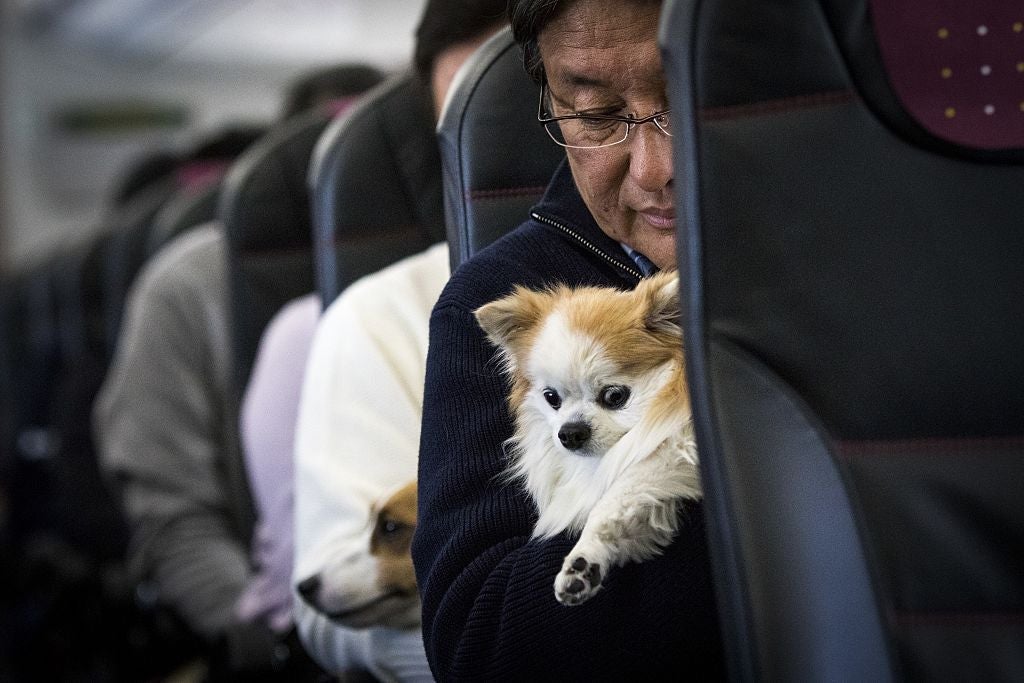Spirit Airlines Adds New Restrictions on Emotional Support Animals
The trend of airlines tightening rules on emotional support animals has reached Spirit. Starting Oct. 15, the budget airline will be adding a wealth of new regulations to its service pet policy.
The new policies were posted recently on Spirit Airlines' website and require significantly more paperwork than their original, single letter from a licensed mental health professional. Now, travelers must submit an additional two forms including the mental health professional form, a veterinary health form and a passenger liability form. All paperwork is due 48 hours before the flight, or the service animal will not be permitted on the plane.
Airlines increasing their regulations on service animals is nothing new. In fact, it's been a movement since Delta swapped its original policy for something stricter back in January. Following this, new policies followed from United and American Airlines, and last month Southwest hopped aboard when it limited permissible emotional support animals to just cats and dogs.
Spirit isn't quite there yet, however it does have a lengthy list of emotional support animals that aren't allowed aboard such as snakes, rodents, reptiles and sugar gliders. "For other unusual animals, several factors determine whether an animal can travel in the cabin as a service animal," states the Spirit Airlines' website. "These factors include: the animal's size, whether the animal poses a direct threat to the health or safety of others, whether it would cause a significant disruption of cabin service, and whether the animal is prohibited from entering a foreign country."
While the increase in limitations is bad news to anyone who needs to travel with their furry companion, it might be beneficial for the airlines themselves. According to a survey conducted in summer 2018, 61% of flight attendants admitted that they do struggle with the emotional support animals misbehaving during flights.
"The problem is only growing and is something that needs to be addressed on an industry-wide level through regulation instead of individual airline policies," said Taylor Garland, a spokeswoman for the flight attendant union AFA.

TPG featured card
at Capital One's secure site
Terms & restrictions apply. See rates & fees.
| 5X miles | Earn 5X miles on hotels, vacation rentals and rental cars booked through Capital One Travel |
| 2X miles | Earn unlimited 2X miles on every purchase, every day |
Pros
- Stellar welcome offer of 75,000 miles after spending $4,000 on purchases in the first three months from account opening. Plus, a $250 Capital One Travel credit to use in your first cardholder year upon account opening.
- You'll earn 2 miles per dollar on every purchase, which means you won't have to worry about memorizing bonus categories
- Rewards are versatile and can be redeemed for a statement credit or transferred to Capital One’s transfer partners
Cons
- Highest bonus-earning categories only on travel booked via Capital One Travel
- LIMITED-TIME OFFER: Enjoy $250 to use on Capital One Travel in your first cardholder year, plus earn 75,000 bonus miles once you spend $4,000 on purchases within the first 3 months from account opening - that’s equal to $1,000 in travel
- Earn unlimited 2X miles on every purchase, every day
- Earn 5X miles on hotels, vacation rentals and rental cars booked through Capital One Travel
- Miles won't expire for the life of the account and there's no limit to how many you can earn
- Receive up to a $120 credit for Global Entry or TSA PreCheck®
- Use your miles to get reimbursed for any travel purchase—or redeem by booking a trip through Capital One Travel
- Enjoy a $50 experience credit and other premium benefits with every hotel and vacation rental booked from the Lifestyle Collection
- Transfer your miles to your choice of 15+ travel loyalty programs
- Top rated mobile app


